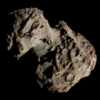Comet Skjellerup–Maristany
 | |
| Discovery | |
|---|---|
| Discovered by | John Francis Skjellerup, Edmundo Maristany |
| Discovery date | December 6, 1927 |
| Designations | |
| Great Comet of 1927, 1927 IX, 1927 X1 | |
| Orbital characteristics | |
| Epoch | 1927-Dec-26 (JD 2425240.5)[1] |
| Aphelion | 2202 AU |
| Perihelion | 0.1761 AU[1] |
| Semi-major axis | 1101 AU |
| Eccentricity | 0.9998[1] |
| Orbital period | ~36600 yr |
| Inclination | 85.1°[1] |
| Last perihelion | December 18, 1927[1] |
| Next perihelion | unknown |
Comet Skjellerup–Maristany, formally designated C/1927 X1, 1927 IX, and 1927k, was a long-period comet which became very bright in 1927. This great comet was observable to the naked eye for about 32 days.[2] It was independently discovered by amateur astronomers John Francis Skjellerup in Australia on 28 November 1927 and Edmundo Maristany in Argentina on 6 December 1927, and noted for its strong yellow appearance and the detection of emission from sodium atoms.[3]
The comet was already visible with naked eye upon discovery and was moving towards the Sun. On 3 December its apparent magntiude was reported to be +3 and its tail was 3 degrees long.[4] Forward scattering of light on 15–16 December 1927 allowed the comet to be seen during daylight if the observer blocked the Sun,[5] C/1927 X1 passed only 1.4° from the Sun on 15 December 1927.[6] It was reported many times brighter than Venus on December 16, so bright that it could be measured spectrographically in daylight. On 17.9 December the magnitude of the comet was reported to be -2. The comet passed perihelion 18 December and was located 10 degrees away from the Sun.[7] After perihelion the comet stayed in the morning twilight for several weeks as it faded.[4] George van Biesbroeck reported that the comet could no longer be detected with certainty without optical aid on 23 December.[7] A long but faint tail up to 40 degrees was visible in the sky between 29 December and 2 January.[4]
Comet Skjellerup–Maristany has been more than 105 AU (15.7 billion km) from the Sun since 2010. It was mentioned in J. R. R. Tolkien's book Letters From Father Christmas.
References
[edit]- ^ a b c d e "JPL Small-Body Database Browser: C/1927 X1 (Skjellerup-Maristany)" (1928-03-29 last obs (arc=115 days)). Jet Propulsion Laboratory. Retrieved 2011-04-07.
- ^ Donald K. Yeomans (April 2007). "Great Comets in History". Jet Propulsion Laboratory/California Institute of Technology (Solar System Dynamics). Retrieved 2011-08-07.
- ^ Adel, Arthur; Slipher, V. M.; Ladenburg, R. (November 1937). "The Sodium Content of the Head of the Great Daylight Comet Skjellerup 1927 K.". The Astrophysical Journal. 86: 345. doi:10.1086/143873.
- ^ a b c Bortle, John. "THE BRIGHT-COMET CHRONICLES". www.icq.eps.harvard.edu. Retrieved 14 September 2024.
- ^ Marcus, Joseph N. (October 2007). "Forward-Scattering Enhancement of Comet Brightness. II. The Light Curve of C/2006 P1" (PDF). International Comet Quarterly. pp. 119–130.
- ^ Horizons output. "Observer Table for Comet C/1927 X1 (Skjellerup-Maristany)". Retrieved 2011-08-07. (Observer Location:Geocentric [500])
- ^ a b van Biesbroeck, G. (1 January 1928). "Comet notes: Comet 1927 k (Skjellerup)". Popular Astronomy. 36: 67. ISSN 0197-7482.
External links
[edit]- Orbital simulation from JPL (Java) / Horizons Ephemeris


